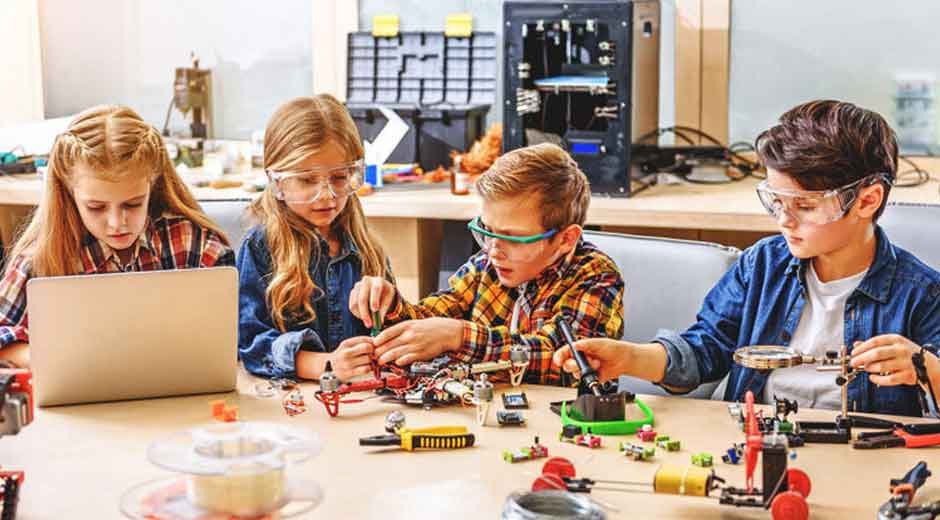STEM and STEAM education are transforming classrooms by preparing students with skills for the future. This blog explores their benefits, challenges, and practical ways educators can integrate these methods effectively.
Table of Contents
Why STEM and STEAM Matter
STEM education has long been celebrated for promoting critical thinking, problem-solving, and innovation. Adding the “A” of Arts shifts the focus further, fostering creativity and enhancing communication skills. Here’s why STEM and STEAM are essential today:
- Bridging the Skills Gap
Industries are experiencing a growing demand for skilled professionals in STEM-related fields, but the talent pipeline isn’t keeping up. STEM education helps close that gap by giving students the foundation needed for these careers.
- Real-World Applications
STEM encourages students to connect their learning to real-world challenges. Whether it’s engineering a bridge or coding a simple app, these practical applications make lessons stick. STEAM takes it a step further, enabling students to communicate their ideas effectively through art and design.
- Fostering Innovation
The fusion of STEM and arts unlocks innovation. Artistic thinking nurtures imagination, making solutions more user-friendly and original. This is the very essence of pushing industries like tech, healthcare, entertainment, and architecture forward.
- Learning How to Learn
Instead of rote memorization, STEM and STEAM are about cultivating flexible, adaptive learners who approach challenges with curiosity and confidence.
Challenges in Implementing STEM/STEAM in Classrooms
While promoting STEM and STEAM education sounds exciting, educators often face real hurdles, including:
- Lack of Resources
Many schools face tight budgets, leaving little room to invest in technology, materials, or teacher training necessary for effective STEM/STEAM programs.
- Teacher Training
Not all educators feel confident teaching STEM subjects or integrating arts into an interdisciplinary framework. Training is essential but not always accessible.
- Student Engagement
Motivating students, particularly those who don’t show an initial interest in STEM or arts, requires creative approaches.
- Inequitable Access
Marginalized communities often have fewer STEM/STEAM opportunities due to resource disparities, further widening equity gaps.
Actionable Strategies for Bringing STEM and STEAM to Life
Despite these challenges, there are practical ways educators can integrate STEM and STEAM into everyday classrooms.
1. Start with Project-Based Learning (PBL)
Project-based learning enables students to explore real-world problems through interdisciplinary approaches. For example, a class in a college preparatory high school like those in Salt Lake City can design a model of a sustainable city, combining elements of engineering, environmental science, and creative design. PBL is an effective way to spark engagement and deepen subject understanding.
2. Make Technology Accessible
Tools like coding platforms (Scratch, Tynker), 3D printers, or even basic devices like iPads can transform students’ learning experiences. For low-resource schools, free or low-cost STEM tools and grants are available.
3. Encourage Collaboration
STEM and STEAM thrive in collaborative environments. Group activities such as designing a robot, composing interactive multimedia, or experimenting with renewable energy sources encourage teamwork, communication, and problem-solving.
4. Focus on the Process, Not Perfection
Encourage students to explore and experiment without fearing mistakes. Both STEM and artistic endeavors involve overcoming failures to achieve creative solutions. This fosters resilience and a growth mindset.
5. Train and Empower Teachers
Professional development programs tailored to STEM and STEAM can help educators feel equipped to teach these subjects. Partnering with tech companies or arts organizations can open up training opportunities.
6. Integrate Arts Naturally
STEAM isn’t about giving equal weight to STEM and art in every subject. It’s about finding natural synergies. For example, a biology lesson on anatomy can incorporate sketching to improve observation skills.
7. Bring in Experts and Mentors
Students benefit immensely from hearing from professionals in STEM/STEAM careers. Guest speakers, workshops, or collaborative projects with local businesses can bring these concepts to life, connecting students with the real-world applications of their education.
Conclusion
STEM and STEAM are no longer optional in education. They’re essential for preparing students for a world that demands adaptive thinkers, communicators, and innovators. By equipping students with these skills, educators help shape the leaders and problem-solvers of tomorrow.
